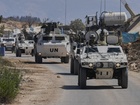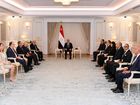After his remarks sparked outrage in Lebanon and beyond, U.S. envoy Tom Barrack has offered an indirect apology to Lebanese journalists who were offended by his chiding remarks at the Baabda Palace, saying his use of the word “animalistic” was not meant to be voiced in “a derogatory manner.”
“I’m just saying, ‘Can we calm down, can we find some tolerance, some kindness. Yeah, let’s be, let’s be civilized.’ But it was inappropriate to do when the media is just doing their job,” Barrack said in an interview with Mario Nawfal on the X platform.
 Full Story
Full Story
The Security Council scheduled a vote Thursday on a resolution that would end the more than four-decade operation of the U.N. peacekeeping force in southern Lebanon on Dec. 31, 2026.
Two council diplomats said late Wednesday that the United States, which had been demanding that the force known as UNIFIL be terminated in a year, did not object to a French draft resolution with that end date in 16 months.
 Full Story
Full Story
Prime Minister Nawaf Salam held talks Wednesday in Egypt's New Alamein City with President Abdel Fattah al-Sisi, in the presence of Culture Minister Ghassan Salameh and Energy Minister Joe Saddi.
During the meeting, Salam explained the government's priorities for the next phase, both in terms of ongoing economic reforms and completing the process of “extending state authority over all its territory,” adding that Lebanon looks forward to strengthening cooperation and integration with all Arab countries.
 Full Story
Full Story
Iranian Foreign Minister Abbas Araghchi has stressed that Tehran is not “interfering in Lebanon’s internal affairs.”
“But that does not prevent us from expressing our opinions and stances and this is what all countries are doing. Saudi Arabia for example is expressing its viewpoint on Lebanon and that is not considered interference,” Araghchi said in an interview with Saudi Arabia’s Asharq al-Awsat newspaper.
 Full Story
Full Story
Lebanese state media said U.S. envoy Tom Barrack cut short a visit to the south on Wednesday amid protests in two planned stops against U.S. pressure to disarm Hezbollah.
The official National News Agency (NNA) reported that Barrack arrived by helicopter at a Lebanese Army barracks in Marjayoun near the border, with soldiers deploying in the area.
 Full Story
Full Story
Speaker Nabih Berri on Wedneday expressed frustration and said U.S. envoys Tom Barrack and Morgan Ortagus "brought nothing from Israel" and "came with something contrary to what they had promised us."
“Things have once again become complicated,” Berri said in an interview with Asharq al-Awsat newspaper.
 Full Story
Full Story
U.S. envoy Tom Barrack told Lebanese journalists at a press conference at the country's presidential palace on Tuesday to "act civilized," sparking outcry and calls for an apology.
As journalists shouted questions after the U.S. delegation's meeting with President Joseph Aoun, Barrack stepped up to the podium in the packed room and said: "We're going to have a different set of rules... please be quiet for a moment."
 Full Story
Full Story
A new U.N. draft text seen by AFP would extend the UNIFIL peacekeeping mission followed by its withdrawal by the end of 2027.
The force was first deployed in south Lebanon in 1978 and was expanded after the 2006 war.
 Full Story
Full Story
At the start of a news conference at the Baabda Palace on Tuesday, U.S. envoy Tom Barrack warned raucous journalists to be quiet, telling them to “act civilized, act kind, act tolerant.”
He threatened to end the conference early otherwise.
 Full Story
Full Story
President Joseph Aoun stressed Tuesday to a visiting U.S. delegation that Lebanon is “fully committed” to the Nov. 27 cessation of hostilities declaration and to the joint U.S.-Lebanese paper that was approved in Cabinet on August 5 and 7 without any selectivity.
The U.S. delegation comprised special envoys to Lebanon Tom Barrack and Morgan Ortagus, Senators Jeanne Shaheen and Lindsey Graham, and Representative Joe Wilson.
 Full Story
Full Story



